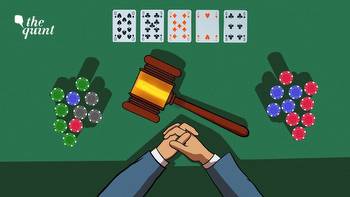Time for progressive law on online gaming

The Tamil Nadu government played to the gallery, when in November 2020, in the backdrop of the Assembly elections, it decided to pass an ordinance banning online games.
The Tamil Nadu government played to the gallery, when in November 2020, in the backdrop of the Assembly elections, it decided to pass an ordinance banning online games. In a single stroke of the pen, the ordinance banned all online games, even saying that "games of mere skill, if played for wager, bet, money or other stake" cannot be allowed in the state.
Three billion people play online games across the world – this is about 40 per cent of the world population. They play all types of games -- racing, sports, action, puzzle, quiz, chess to card games. It is not possible to club lakhs of games that exist in the world under one category.
Of the three billion people who play online games, there is a good percentage of people who pay entry fees to participate in online skill tournaments or enter tournaments to earn prizes, and these were the people being deprived by the Tamil Nadu law.
The Madras High Court in its recent judgement rightfully held that the Tamil Nadu ordinance was excessive and disproportionate to the object sought to be achieved. It also held the law as violative of Article 19(1)(g) of the Constitution, which guarantees all citizens the right to practise any profession or carry on any occupation, trade or business.
The Madras High Court thus upheld what the Supreme Court and several high courts have affirmed in numerous judgments that games of skill, whether online or offline, is a perfectly legitimate activity.
Let's examine the rationale put behind by the Tamil Nadu government and also by the critics of online gaming. Some say in online games, players end up spending a lot of money for buy-in and add-ons. Sure, compulsive shoppers end up overspending on Amazon and Flipkart, but that should not be a reason for banning them.
Many responsible gaming apps have best practices that limit the amount of money one can use to play these games. Also, there are regular notifications to warn players if they are spending too much money. Regulation can be introduced to ensure all gaming apps follow this rule.
The second argument that is put forth is that gamers spend too much time on the gaming platform. This could be true not just for skill gaming apps, but for any online game like Free Fire or Battlegrounds Mobile India, or streaming platforms like YouTube or Netflix.
However, this is an issue that needs to be addressed and legitimate gaming apps have warning notifications if a person is spending too much time playing games and this should be a standard feature across all gaming platforms.
The third argument is that innocent people are being cheated. While this looks like a general statement, the issue really is of fair play. All reputed platforms usually obtain random number generators, and no-bots certificates from global firms, to ensure that a user is not playing against a computer and maintain fairness and transparency.
The specifics for each operator may vary, but all Indian operators should ensure that the platforms are safe, secure, and fair and they are constantly innovating on this end.
Some critics say that these games are played by kids of all ages. This is a malicious and misleading argument as far as skill gaming platforms are concerned. There are several games that are meant for kids - games that are meant to aid their language, comprehension, maths etc. These are different from skill gaming apps.
It is important to distinguish between games of chance and games of skill. What are games of chance? These are games where luck is the most important factor for winning. These are pure luck games like instant win scratch cards, online bingo, online lottery, casino gaming, teen patti etc. Games of skill on the other hand involve significant playing skill like strategy, mental or physical skill.
While the Madras High Court judgement makes it abundantly clear about the validity of online games of skill, it is an opportunity for various state governments to make progressive laws relating to online gaming. Not just the Tamil Nadu government, but Andhra and Telangana governments that have adopted blanket ban ordinances, must examine all aspects before framing a new law that considers the interest of all stakeholders -- gamers, industry, gaming tech sector and esports sector.
More importantly, the law makers should not be misled by ill-informed activists and have detailed discussions with experts and industry bodies. What is important is that the law should weed out all unscrupulous players and only promote and encourage skill gaming platforms that adhere to the highest standards of ethics and fair play.
(The writer is the Founder of Policy Matrix, New Delhi)



































